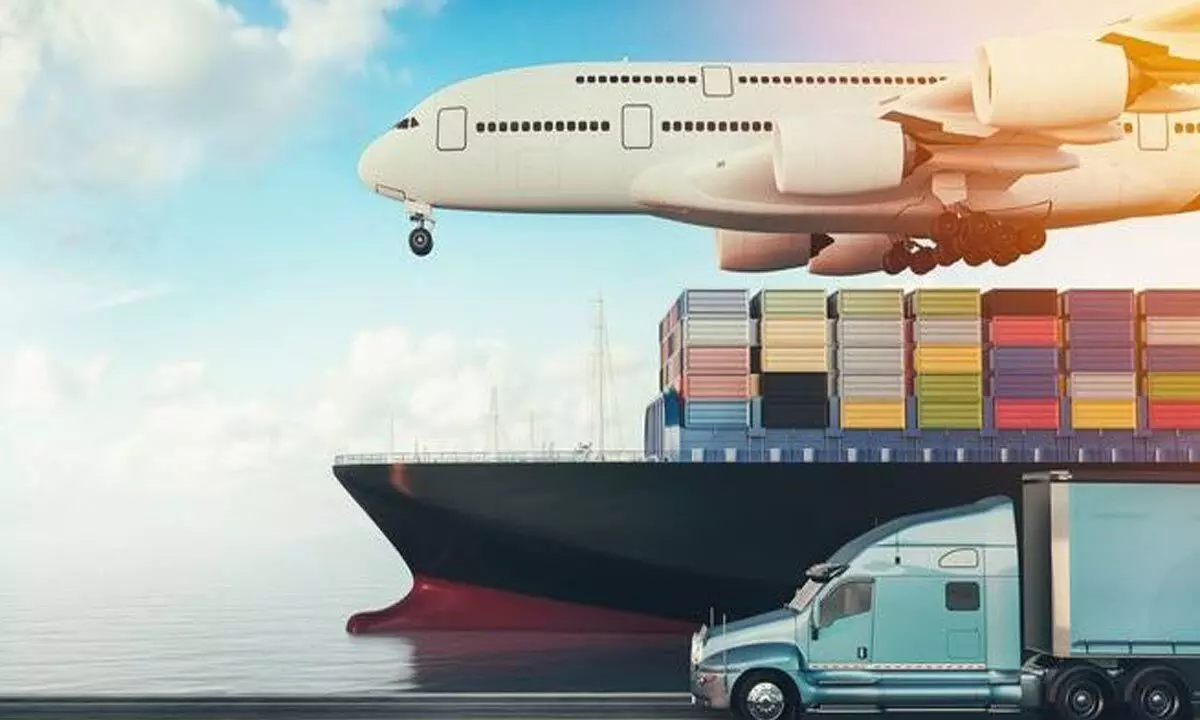Stakeholders expect huge allocation for cutting logistics cost
The Prime Minister’s Gati Shakti (PMGS), Bharatmala and Sagarmala projects are on top priority
image for illustrative purpose

The national logistics policy has been a significant step forward in mobilising the power of digital transformation, particularly platformisation, to break down logistics silos. The upcoming budget will most likely move it forward by strengthening its foundation for its seamless implementation and reducing logistics costs, say logistics stakeholder
The general budget for 2023-24, for which a massive exercise has been launched, has raised high expectations among the stakeholders in the logistics sector with top priority being attached to the Prime Minister's Gati Shakti (PMGS), Bharatmala and Sagarmala projects.
The Gati Shakti is a mega project for which the National Master Plan has been finalised. The plan envisages multimodal connectivity at $1.2 trillion to provide competitive advantage to manufacturing in the country. Prime Minister Narendra Modi kick-started the Gati Shakti programme on October 13, 2021 with an aim to break inter-ministerial silos and a coordinated mechanism for integrated planning and execution of infrastructure projects so as to reduce the logistics cost.
Sagarmala is a programme to unlock the potential of waterways and the coastline to reduce infrastructural investments by laying focus on port-led development and improving transport from and to the ports for faster evacuation of cargoes. On the other hand, the Centre provides funding for roads, highways and expressways with a total network of 83,677 km with a total investment of Rs 10.63 lakh crore.
When Bizz Buzz contacted a few stakeholders from the logistics sector, they exuded confidence that the Centre will give the sector its due in the Union Budget.
Zaiba Sarang, co-founder, iThink Logistics said, logistics is one of the most competent industries in the world, to the point where it is regarded as the foundation upon which all other businesses are built. "As a result, when discussing budget allocation, we must recognise how critical it is to not only invest in this sector but also to ensure that our investments are directed toward areas that truly matter. Logistics is one of the unorganised industries, so we should anticipate investments in activities that will make it more organised," she said.
PM Gati Shakti, for example, has focused on seamless multimodal connectivity to enable smooth operations. "We can anticipate the implementation of the National Logistics Policy, which will reduce the cost of GDP from 14 per cent to single digits. As we all know, logistics is one of the world's largest carbon-emitting sectors; there has been discussion about investing in making this sector carbon-neutral by using less carbon-emitting fuels, electric scooters, and other similar technologies. On top of that, we can expect Rs 2 lakh crore in investments in port infrastructure to alleviate logistics inefficiencies," Sarang pointed out.
Overall, she said they can predict that 2023 will be the year when the logistics industry reaches its full potential.
Dhruv Agrawal, COO and co-founder of Shipsy (end-to-end global trade and logistics management platform), said the logistics and supply chain industry has long been challenged by the sectors highly fragmented nature, multiple regulatory bodies, manual approval processes, poor shipment visibility, lack of stakeholder collaboration, growing cost leakages, rising logistics costs, and evolving customer expectations.
The national logistics policy has been a significant step forward in mobilising the power of digital transformation, particularly platformization, to break down logistics silos. The upcoming budget will most likely move it forward by strengthening its foundation for its seamless implementation and reducing logistics costs. He said besides, there is an urgent need to address climate change concerns through regulations. It will be excellent if the government allocates funds to develop policies that ensure sustainable logistics practices through digitisation. The last-mile emissions per delivery in India are 285g CO2, higher than the global average of 204g CO2. Businesses can gradually reduce their carbon footprint by digitizing core logistics operations. This can be accomplished by shrinking the miles traveled per package and ensuring that the distance is covered using greener delivery modes.
He said the thrust to expedite the development of multi-modal logistics parks will also be welcomed by the logistics industry, as it will facilitate lowering logistic costs and carbon emissions significantly. Emphasis on closing the digital skill gap in the logistics sector will also be beneficial.
A BOT operator of Visakhapatnam Port Authority said with elections scheduled in just a year and few months from now, they are expecting substantial allocation of funds by improving connectivity for faster evacuation of cargo. The Prime Minister also launched several connectivity projects for Andhra Pradesh and Telangana during his recent visit to Visakhapatnam aimed at reducing the transportation time. The time-bound implementation of Dedicated Freight Corridors, eight-lane expressways, and fast-moving trains by removing bottlenecks in cargo movement will go a long way in drastically slashing logistics cost, he said.

